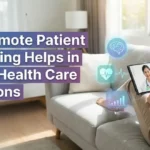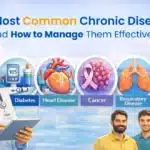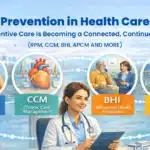Medication Therapy Management (MTM): All You Need to Know

According to the National Institute of Health (2024) over 50% of medications are being taken in ways other than as prescribed. Furthermore, the rise in non-adherence has been alarming, leading to the rise of health problems that could have been prevented.
The Centers for Disease Control (CDC) reported that non-adherence causes 125,000 preventable deaths every year. In addition, the number of adverse drug events (ADEs) led to around 1.3 million emergency department visits and 350,000 hospitalizations in 2023-24- many of which were preventable. And the financial costs are staggering too. All of this points to a confronting reality in the healthcare system, i.e. though medications are prescribed to heal, they may cause harm if not taken in the correct dosage and at the prescribed time..
This is where Medication Therapy Management (MTM) fits in. As a formal and patient-centered process, it ensures that the medications are both safe and effective and that the patients understand, feel supported, and adhereto their medication regimen.
Table of Contents
ToggleWhat is Medication Therapy Management (MTM)?
MTM is an extensive program offered by pharmacists or other licensed healthcare professionals within
a collaborative care model. It includes:
- A comprehensive review of all medications (prescription, OTC, supplements)
- Identification of drug interactions, duplications, or unnecessary therapies
- Education of patients on proper use, expected effects, and side effects
- Collaboration with providers to modify and/or streamline regimes only when necessary
- Monitoring and surveillance, and adherence to treatment by the patient.
Add 1more:
Adherence to MTM requirements ensuring compliance with Medicare and other regulatory standards, helping avoid potential penalties.
Why is MTM Needed More Than Ever?
Healthcare is becoming increasingly complex, and so are the needs of patients. Here are 5 reasons why MTM is important:
- Rise in Chronic Conditions: More than 60% of adults in the U.S. live with at least one chronic disease—like diabetes, hypertension, or respiratory disease (like COPD)—many of which need multiple medications to treat. Polypharmacy increases the risk of drug interactions, poor adherence, and confusion for patients. Remote Patient Monitoring (RPM) platforms that support MTM can help detect early issues, reduce re-hospitalizations, and promote adherence.
- Polypharmacy is the Norm: Polypharmacy, or the involvement of five or more different medications, is common in the middle aged and elderly population, where many individuals are taking medications from different providers and are at higher risk for adverse drug effects, drug interactions, and confusion about which one to take when. MTM helps individuals cut through the complexity of managing multiple medications and streamlines their understandings of therapy.
- Adverse Drug Events are a Public Health Concern: ADEs are a major public health concern: According to the FDA, ADEs cause about 1.3 million emergency department visits and are responsible for about 350,000 hospitalizations each year. Even worse, many of these cases are entirely preventable and MTM could intervene and stop ADE from occurring.
- Patient Confusion and Low Adherence: Patients are often confused about their medications, especially when they get directions from multiple providers. Providing patients with knowledge and support through MTM leads to improved adherence.
- Soaring Healthcare Costs: Using medications at uneven times leads to complications and exacerbations. Patients return to the hospital because of unmet medication needs or complications. According to the IMS Institute report (2012), the annual costs associated with non-optimized medication therapy in the U.S. was estimated at more than $528 billion a year. MTM is in a position to directly reverse this trend.
Scope of MTM Services
MTM services can be administered in-person, online, or even through counseling via audio call. Depending on patient needs and the provider’s practice setting, MTM services scope may differ, but has similar requirements that typically include:
- Comprehensive Medication Review (CMR): CMR refers to a formal medication review via a structured assessment of medication use, effectiveness, and safety. CMRs are often annual and form the basis of MTM services.
- Targeted Medication Review (TMR): These reviews are focused on smaller aspects of the medication review process and take place periodically based on identified needs like unwanted drug interactions, or certain changes in a therapy.
- Medication Action Plan (MAP): A documented plan developed together with the patient to assist them and care staff with actionable steps to optimize their medications. It should be completed in simple, patient-friendly language.
- Personal Medication Record (PMR): A personalized medication record is updated on all medications the patient is taking, including the dose, frequency, purpose, etc. Clear and seamless communication between healthcare settings is key to ensuring accurate medication management and continuity of care
- Interventions and Referrals: Real-time communication between pharmacists and the prescribers’ source permits a broad application of “clinical judgment” with recommendations for change, discontinuation of unneeded medications, or consideration for alternative therapies.
- Follow-Up and Monitoring: A complete evaluation requiring efficacy change and/or edition to the existing regimen for adherence based on ongoing evaluation
Benefits of Medication Therapy Management
MTM supports all stakeholders in delivering safer, more coordinated, and cost-effective care. There are multiple ways MTM services benefit patients, providers, and payers.
- For Patients: Fewer side effects, better understanding, improved outcomes
- For Providers: Less manual tracking, improved quality metrics, clinical support
- For Payers & Health Systems: Reduced ER visits, higher HEDIS/Star Ratings, cost efficiency
Billing and Reimbursement for MTM Services
Billing/ reimbursement is a necessity for supporting the MTM services. Thankfully, there are standard CPT codes and models for this.
The Most Common CPT Codes for MTM:
- 99605 – First 15 minutes with a NEW patient
- 99606 – First 15 minutes with an ESTABLISHED patient
- 99607 – Each additional 15 minutes (can bill with 99605/99606)
These codes are the same that Medicare Part D, Medicaid, and many private insurance companies will accept. It is the responsibility of the provider to document timing, services rendered, and outcomes for compliance.
Things to Consider When Implementing an MTM Program
Setting up and successfully running an MTM program requires much more than just clinical expertise. Use these best practices as you start your program:
- Focus on Eligible Patients: MTM will have the most success when you focus on:
- Patients with multiple chronic conditions
- Patients on 5 or more medications
- Patients with an annual dispense medication cost exceeding $4,935 (per Medicare 2024 thresholds)
- Documentation: Careful and standard documentation should be completed for each encounter. Documentation is important for billing, compliance, and continuity of care.
- Encourage Cross-team Coordination: MTM is best positioned to make a difference when pharmacists are able to share recommendations and collaborate with the physician, nurse, and care coordinators, and have shared care goals. Use HIPAA-compliant platforms with secure data sharing and patient dashboards for simplified MTM delivery.
- Utilize Latest Technology: Utilizing a secure, interoperable, technology-based care management platform, like HealthArc, for payment and monitoring that incorporate:
- Medication history
- Drug interaction checks
- PMRs and MAPs
- Identify virtual MTM visits
Enable Smarter Medication Therapy Management With HealthArc’s MTM Platform
Medication Therapy Management is not a luxury; it’s a necessity in today’s healthcare environment. With the prevalence of chronic diseases and the complexity of medications, MTM ensures the right drugs, at the right dosage, at the right time. It reduces hospitalizations, decreases costs, improves parameters such as quality of life, and educates and empowers patients to take ownership of their treatment.
HealthArc empowers clinics and pharmacies to deliver smarter, scalable MTM program. Our intelligent care platform gives pharmacists and providers more time to provide, document, and scale MTM:
- CMR, PMR, and MAP templates
- Dashboard and analytics
- HIPAA compliance
- Automated billing assistance
- EHR compatibility
If you are a pharmacy or a healthcare organization managing a value-based care model and trying to scale MTM, HealthArc can help you deliver patient-centered services. Book a demo and learn how our unified care platform makes personalized medication care easy, smart, and scalable.
Frequently Asked Questions (FAQs)
Medication therapy management refers to a service that optimizes medication use based on patients’ needs. MTM seeks to optimize medication use while reducing complications, ensuring adherence to medication plans as well as preventing adverse medication reactions. Collaborations with patients, practitioners, and healthcare providers as a whole ensure proper medication use, effectiveness, and coordination with care.
As is the case with many MTM services, it is likely offered to beneficiaries with Medicare Part D. Part D beneficiaries who have multiple chronic ailments and are taking several medications, as well as those who may incur high medication costs, are likely to be eligible for MTM services. The same is true for many private health insurers.
Included are: Evaluation of patients in the form of CMR (Comprehensive Medication Reviews); Action plans geared towards safety and adherence to medications, MAPs (Medication Action Plans); We reach out to prescribers and conduct follow-up consultations to guarantee correct medication usage and continuous enhancement of prescribed medications.
The main goal of Medication Therapy Management (MTM) is to make sure the medications of the patients are being used safely, effectively, and appropriately to improve therapeutic outcomes. It is intended to assist patients in managing complex medication regimens.
MTM is able to prevent adverse drug events (ADEs) by finding potential drug interactions, drug duplications, or medication errors and creating a plan of targeted interventions to prevent harm.
Patients taking multiple medications, patients managing chronic conditions, and patients having problems related to their medication are those who can often benefit most from MTM services.
During an MTM session, a pharmacist will make clinical assessment of all medications currently being taken by a patient while reviewing possible problematic issues or side effects. The pharmacist will also educate patients and in some cases, may modify therapies with the patients’ prescriber.
MTM services are typically a covered service by Medicare (specifically through Part D) and maybe also by some private insurance plans. These services are for patients that are taking multiple medications for multiple chronic conditions, are managing or having disease state issues related to medications.
Improving the implementation of MTM by reducing unnecessary medications enhances a patient’s understanding of their treatment. MTM enhances chronic disease management and reduces hospital stays by avoiding unnecessary medication use and preventing duplicate therapies and drug interactions.
Primary care providers MTM services are largely offered by pharmacologists as they work in tandem with physicians, nurse practitioners, and care coordinators to round out the care plans for patients and improve the care overall.
It is a well-known healthcare fact that MTM aids in the reduction of readmissions, averts expensive adverse drug incidents, and assists in achieving the goals of value-based care. Thus, it is an important resource for providers seeking improved outcomes and enhanced savings.
Absolutely. For MTM-eligible beneficiaries, Part D MTM services are covered. Furthermore, providers can also bill for medication reviews under certain CPT codes, which are dependent on a given program’s conditions.
An annual comprehensive medication review should be conducted, along with a thorough assessment of the patient’s health and any recently prescribed medications, to identify necessary adjustments to the support strategy.
Of course. MTM can be offered in person, by phone, or through secure telehealth technology. This flexibility is helpful for patients with mobility or transportation difficulties.
Eligible patients are automatically enrolled by their health plans. Alternatively, patients can request MTM services through their pharmacists, physicians, or care team.
Most Recent Blogs
Categories
Related Blog
- December 5, 2025 | Read Time: 8 mins
Medication Therapy Management (MTM): Reducing Polypharmacy Risks in Older Adults
Approximately 30% of older adults in the U.S. are currently using five...
Learn More- July 15, 2025 | Read Time: 17 mins
Medication Therapy Management: An Essential Overview for Providers
The U.S. healthcare system is in urgent need of value-based medication models...
Learn More- June 6, 2025 | Read Time: 9 mins
Medication Therapy Management (MTM) in 2025: Latest Updates and Use Cases for Providers
What is Medication Therapy Management (MTM)? Medication Therapy Management or MTM is...
Learn More


